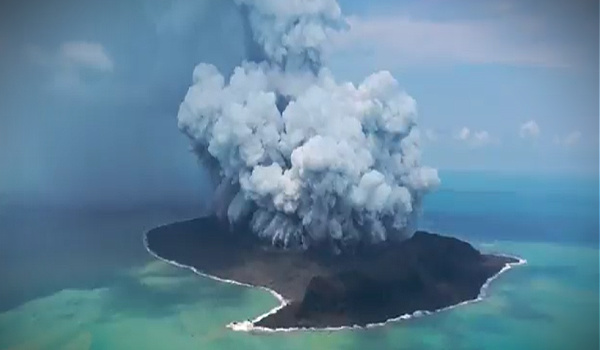Just when a great idea begins to unfold, plans are laid out with a solid timeline and a nation is about to undertake a game-changing financial evolution, something unforeseen comes along. Damn. Take the case of Tonga, an island nation way down in the South Pacific. Tonga was set to become the second country to adopt Bitcoin as legal tender, copying El Salvador’s model and legislation just before plans were, uh, “interrupted”. So what happened? Oh, a massive undersea volcano erupted causing a tsunami and basically wiping out much of the nation.
If there were a perfect fit for “Bitcoinization”, Tonga would be that country. Tonga is a remote island nation that relies upon remittances from other countries, including Australia, New Zealand and the United States. The International Finance Corporation estimates that Tonga receives more income from remittances than any other country in the world. Those remittances contribute up to 30% of Tonga household’s income. Now while the Tongan population numbers just six figures, the Tongan diaspora is vast. The International Organization for Migration estimates the Tongan population living abroad is just over 126,000.
Keep in mind the remittance use case was one of the basic drivers for El Salvador adopting BTC as legal tender, and a main driver for Tonga looking to do the same.
According to the World Bank, Tonga’s remittance as a percentage of gross domestic product is substantially higher than El Salvador’s: 39% vs. 24%. Other than just remittance, there are domestic advantages for adopting the open-source protocol as well.
Tonga could create a BTC circular economy and it’s “one of the few instances in which being a sparsely populated small island kingdom archipelago is an advantage.” Tonga is actually further ahead of El Salvador with internet and smartphone penetration rates exceeding 90%, too. That even may be a huge help in rebuilding from the volcano.
So will this “pesky” undersea volcano stop Tonga’s Bitcoin adoption? Hardly. The lead on the project is Lord Fusitu’a, a former member of parliament for Tonga. Ironically he had just released an ETA schedule for Bitcoin becoming legal tender in Tonga (of course this was all “pre-volcano). To be sure there will be some delay, BUT just look at how fast things can move in some smaller countries.
Consider Lord Fusitu’a’s timeline:
- “Sept/Oct Bill goes to Parliament. Passed.
- Sent to Palace Office for submission to His Majesty for Royal Assent.
- A month – HM as advised by Privy Council assents to Bill.
- 2-3 Weeks Gazetted by Govt activation date set.
- On activation date BTC becomes legal tender.”
So there is still a lot of time for Tonga to become the second global country to adopt Bitcoin as legal tender, even with this week’s “little setback”.
Then when other countries see just how fast the adoption can be implemented the dominoes will begin falling. Rapidly. Thank you El Salvador.
And remember, life is full of undersea volcanoes.







